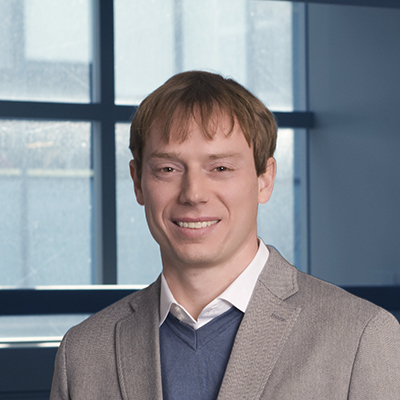First, so we’re all on the same page: Quantum information science is a field that uses the physical properties of quantum mechanics to process information.
Lee Bassett, an associate professor in electrical and systems engineering at the University of Pennsylvania, explained that quantum technology encompasses several STEM fields — all of which are listed in the name of Penn’s newly launched Center for Quantum Information, Engineering, Science and Technology (Penn QUIEST).
(Yes, the I is pronounced, like “kwee-est.”)
“You have quantum physics, you have information science, you have engineering, and then you also have science and technology because the whole point here is to develop applications that are useful,” he told Technical.ly.
Over the last decade, quantum science became a STEM field that appeared to have a long-lasting impact, and Penn wanted to figure out a way to interact with it, said Bassett, who is the director of Penn QUIEST. The university already has established programs in fields related to quantum, including medical technology, biotechnology, materials science, information technology and physics. But it took a couple years for a hub for quantum technology at Penn to get off the ground.
“We sort of laid out, this is really where we already have strengths and it makes sense to form a center that can help to bring those things together, but also we want to recruit new research groups to enhance that and to bring in new directions and bring things together in order to accelerate that impact,” he said.
“This is, I think, a really big opportunity to leverage a lot of the really strong existing research programs that Penn has.”Lee Bassett Center for Quantum Information, Engineering, Science and Technology
Penn QUIEST is a joint initiative between the School of Engineering and Applied Sciences and the School of Arts and Sciences, and convenes 30 faculty members from both schools.
Bassett said the university has brought on two new faculty members in the quantum information science field over the last two years, and though it will take a few years to recruit more faculty members and establish research projects in Penn QUIEST, recruitment and outreach initiatives are expected to start immediately.
Quantum technology doesn’t fit perfectly into its own box, but touches a lot of different fields and degree programs. Penn wants to coordinate curricula across different programs so that all those students can experience working with it. Per Bassett, research related to quantum information science was already happening at the university before Penn QUIEST was established, but there wasn’t a central community for it.
Such a program “is important so that prospective students know that this community exists,” the director said. “They know what degree options are available to them, so that faculty can work with each other. Graduate students can meet each other, especially when they’re in different schools or different departments.” There are a few other universities around the countries with similar quantum centers, but Bassett thinks Penn is the first to do so in the Philadelphia region.
Bassett said it’s important for anyone in the STEM fields to have basic knowledge about the technology because companies are already incorporating quantum science into products. Penn QUIEST allows students with a particular interest in quantum technology to pursue those specific opportunities — for example, becoming an engineer for companies building quantum computers, or using quantum computers for artificial intelligence.
He’s excited for all the collaboration and new research opportunities that Penn QUIEST could enable, “whether that’s working with new students that are interested to come, new faculty members that we recruit that are going to start up labs, that are going to develop new technologies,” he said. “This is, I think, a really big opportunity to leverage a lot of the really strong existing research programs that Penn has, and also more broadly in our Philadelphia region.”
Sarah Huffman is a 2022-2024 corps member for Report for America, an initiative of The Groundtruth Project that pairs young journalists with local newsrooms. This position is supported by the Lenfest Institute for Journalism.Join the conversation!
Find news, events, jobs and people who share your interests on Technical.ly's open community Slack

Philly daily roundup: Student-made college cost app; Central High is robotics world champ; Internet subsidy expiration looms

Philly daily roundup: Earth Day glossary; Gen AI's energy cost; Biotech incubator in Horsham

Will generative AI replace software developers?



